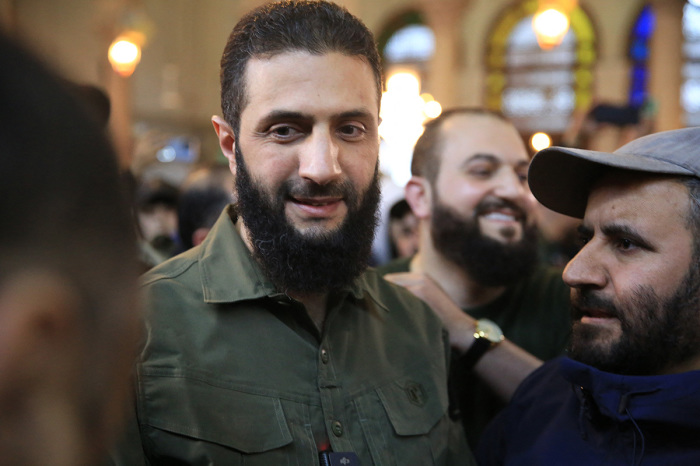
Syrian security forces conducted nationwide raids against suspected Islamic State operatives, detaining dozens, before President Ahmed al-Sharaa's scheduled historic meeting with U.S. President Donald Trump at the White House on Monday.
The visit follows recent diplomatic overtures between the two governments, including the removal of al-Sharaa, a former leader of an al-Qaeda affiliated terror group, from the United States and United Nations terror sanctions lists.
Syria's interior ministry said Saturday that 61 coordinated raids were carried out across the country, resulting in 71 arrests and the seizure of weapons and explosives.
The raids were reportedly conducted based on "precise" intelligence, with evidence linking the detainees to planned terrorist activities and efforts to recruit youth for militant operations, Sky News reports.
Interior ministry spokesperson Nour al Din al Baba told al Ekhbariya TV that "the current major threat lies in IS' attempts to reconstitute itself and recruit new members, particularly among the youth."
Officials say they have intercepted information suggesting the Islamic State, a brutal terror organization that controlled regions of Iraq and Syria during the mid-2010s, is preparing new attacks.
The crackdown coincides with al-Sharaa's arrival in the U.S., the first visit by a sitting Syrian president to Washington since the country's independence in 1946. Al-Sharaa took office after the ouster of former President Bashar al-Assad late last year. Assad, who ruled Syria for 25 years, fled to Russia following the collapse of his regime.
Al-Sharaa, who once led the al-Qaeda Syrian branch, Al-Nusra Front, has since distanced himself from the group and has taken steps to align Syria with U.S. regional objectives.
His meeting with Trump is expected to solidify Syria's entry into the U.S.-led coalition against the Islamic State group. Al-Sharaa and Trump previously met in May in Riyadh during the American president's regional tour.
U.S. envoy to Syria Tom Barrack said earlier this month that al-Sharaa was expected to sign an agreement to formally join the coalition.
Al-Sharaa is also reportedly using the trip to push for the full repeal of the Caesar Act, a sweeping sanctions regime enacted in response to human rights abuses committed under Assad, according to The Washington Post. Although the sanctions are currently waived under presidential authority, a permanent repeal would require a congressional vote.
"Syria's economic recovery and investment growth" depend on the lifting of sanctions, Syria's Ministry of Information said in a statement on Sunday, reaffirming the government's commitment to combating terrorism and promoting regional security.
On Thursday, the U.N. Security Council voted to lift sanctions on both al-Sharaa and his interior minister, and the U.S. subsequently removed them from its "specially designated global terrorist" list. The U.K. followed suit on Friday.
Trump confirmed the decision ahead of al-Sharaa's visit, saying on Thursday that "Sharaa's doing a very good job so far."
"It's a tough neighborhood and he's a tough guy, but I got along with him very well, and a lot of progress has been made with Syria," Trump told reporters on Thursday.
U.S. State Department officials said the decision to lift sanctions recognized progress by Syrian leadership, including cooperation on dismantling chemical weapons and efforts to combat narcotics.
Al-Sharaa's government has made overtures to international allies to reestablish diplomatic and economic relations. The World Bank in October estimated the cost of rebuilding Syria after more than a decade of civil war at $216 billion.
The U.S. is also preparing to establish a military presence at an airbase in Damascus to support a new security agreement between Syria and Israel, Reuters previously reported.
Al-Sharaa's past affiliations remain a point of contention.
Two decades ago, he was detained at a U.S.-run facility in Iraq for fighting alongside al-Qaeda militants. He later severed ties with the group and has since led efforts to distance Syria from extremist networks.
Minority communities in Syria remain wary.
Sectarian violence over the past year has involved pro-government Sunni fighters attacking Alawite and Druze civilians. While al-Sharaa has vowed to hold those responsible accountable, trust remains fragile, and key U.S. lawmakers are divided over the pace and conditions of lifting sanctions.
In Congress, efforts to repeal the Caesar Act have advanced in the Senate as part of the annual defense authorization bill, but negotiations with the House are ongoing. Some Republican lawmakers have demanded conditions be attached, including provisions for minority protections, peaceful regional relations, and the removal of foreign fighters from Syria's government and military ranks.
Sen. Lindsey Graham, R-S.C., a close Trump ally, has supported conditional repeal, while Rep. Brian Mast, R-Fla., who chairs the House Foreign Affairs Committee, has raised concerns about a full rollback of sanctions.